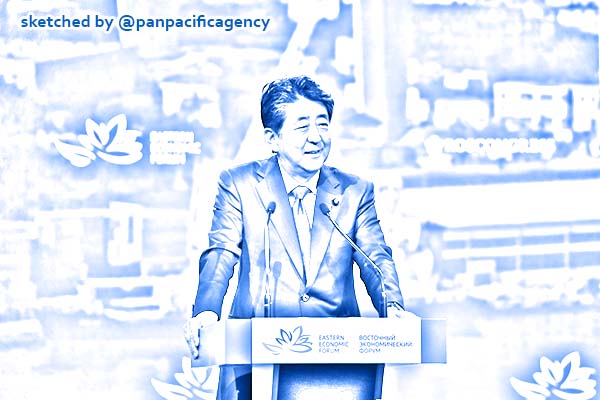[Analytics] Japan-Russia talks on peace treaty, Northern Territories have whiff of futility

Shinzo Abe. The Eastern Economic Forum — 2019. Vladivostok, FEFU. Photo by Vyacheslav Viktorov. Sketched by the Pan Pacific Agency.
Prime Minister Shinzo Abe met for talks with Russian President Vladimir Putin on Sept. 5 on the sidelines of the Eastern Economic Forum in Vladivostok, in Russia’s Far East. The last time they spoke face-to-face about hammering out a formal peace treaty was in Osaka in June, though there was no progress to be seen then. The two leaders’ most recent tete-a-tete, too, seems to have produced no decisive movement, resulting in only a commitment to “working with a forward-facing attitude,” reported The Mainichi.
The former Soviet Union launched hostilities against Japan in the dying days of World War II, and no peace treaty was signed between the two countries in the ensuing decades.
The issue that must be resolved before a peace treaty can be signed is the fate of the Northern Territories, a clutch of islands just off the coast of the northernmost prefecture of Hokkaido. Seized by the Soviets in 1945, the islands remain under Russian control but are claimed by Japan — and Abe and Putin do not see eye-to-eye on their return to Japanese sovereignty. The pair’s Vladivostok talks did nothing to change this.
In fact, circumstances surrounding to bilateral territorial talks are getting rougher, which forces us to ask: Is the government even able to sketch out a concrete resolution to this process?
The present negotiations were seeded by Putin’s proposal, made at the 2018 Eastern Economic Forum, to sign a peace treaty with Japan “with no preconditions.” They have since proceeded based on a 1956 Soviet-Japanese joint declaration that included a commitment to restore two of the four islands, Habomai and Shikotan, to Tokyo’s control.
However, before settling the dispute over the sovereignty of the Northern Territories, Russia has insisted that Japan recognize the islands’ seizure as a legal consequence of World War II’s outcome. This precondition has stalled the talks.
Abe and Putin’s affirmation of their “forward-facing attitude” was apparently a Japanese request. It was very likely aimed at reinforcing the position that negotiations should not be based on asserting one view of history over another, but on present practicalities.
It is Japan’s position that the Soviet Union’s occupation of the Northern Territories violated the two powers’ non-aggression pact, signed in 1941. That may be true, but we wonder whether it will prompt any concessions from Moscow.
Meanwhile, Russia is increasing its military presence on the islands, reinforcing its control. It appears that the country now views the territories as strategically essential for confronting the United States after the Intermediate-Range Nuclear Forces (INF) Treaty between Moscow and Washington fell apart earlier this year. After his meeting with Abe, Putin pointed to the Japan-U.S. security treaty as an obstacle to signing a peace treaty, his eyes fixed firmly on Russia’s Cold War rival.
Moscow’s position on joint Japan-Russia economic development of the Northern Territories has also hardened. In Vladivostok, Abe and Putin agreed to start trial tourism excursions to the islands in October. However, Russia has not backed down from its insistence that these be conducted “according to Russian law.”
Before his meeting with Abe, Putin sent a live, congratulatory video message to the opening ceremony of a seafood processing plant on Shikotan. The move appeared intended to demonstrate that Russia was pushing the economic development of the islands entirely by its own efforts.
The joint-development proposal was originally a mutual trust-building phase in bilateral relations, proposed by Abe. However, talks on the territories are stalled, and Russia’s attitude is stiffening.
We do not reject either the “forward-facing attitude” proclamation or the joint economic development initiative, but there is nothing to be gained by expending so much effort just to keep talks alive.